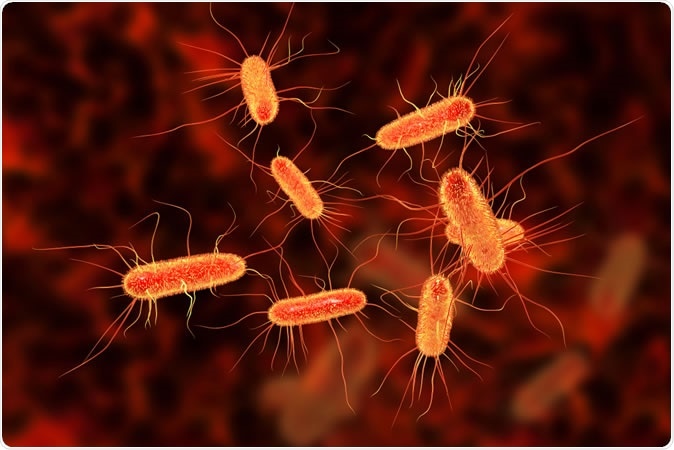You might want to ditch your salad this holiday season, as the Centers for Disease Control and Prevention (CDC) and the U.S. Food and Drug Administration (FDA) warn against an outbreak of Escherichia coli (E.coli) linked to chopped salad kits.

Escherichia coli bacterium, E.coli, gram-negative rod-shaped bacteria, part of intestinal normal flora and causative agent of diarrhea and inflammations of different location, 3D illustration Credit: Kateryna Kon / Shutterstock
The CDC has identified the new outbreak of E. coli infections tied to leafy greens, with cases spanning the United States and Canada. The health officials identified a likely source of the outbreak, Express Sunflower Crisp chopped salad kits.
The CDC and U.S. FDA are now investigating the outbreak in three states, Minnesota, Wisconsin, and North Dakota, with eight confirmed cases. In Canada, there were reported 24 people infected with the same strain of the bacteria.
Recent data shows that three people had been admitted to hospitals, with a patient developing hemolytic uremic syndrome, a kind of kidney failure. However, there were no reported deaths.
The current outbreak is not connected to a previous outbreak linked to romaine lettuce from California, which had a different strain of E.coli. Though lettuce is an ingredient in the Sunflower Crisp salad kit, further investigation is being performed to determine which ingredient was contaminated.
The agencies warned the public to refrain from eating, selling, or serving the concerned product, Fresh Express Sunflower Crisp Chopped Salad Kits with UPC 0 71279 30906 4 code, beginning with lot code Z, and a best-before date up to December 7, 2019. The information of the product is seen on the front part of the bag, in the top right corner.
For residents, they are advised to check the refrigerator for this salad kit and throw it away in case they have it. If some of the kit has been eaten and no one got sick, they should throw it away. For those who had the product, wash and sanitize the interior of the fridge where the salad was stored.
Those who got sick after consuming the product, write down everything consumed a week before getting sick and report to a health department or doctor as soon as possible. To refrain from having others contract the bacteria, always practice regular handwashing and refrain from preparing food for a week or so.
“Because of the expansive nature of these outbreaks, our investigation remains a complicated work in progress, and it is too soon to draw definitive conclusions. The FDA, CDC and our state partners have identified a common grower between each of the outbreaks, which is a notable development,” the FDA says in a statement.
“This finding reinforces our earlier traceback results. It’s still too early to conclusively determine whether other sources may have also been involved in the outbreaks. However, progress is being made, and the FDA is actively investigating other traceback leads identified to determine if we can triangulate a more precise location of the contamination. We will provide updates to the public as further information becomes available,” it added.
What is Escherichia coli infection?
Escherichia coli (E. coli) is a bacterium commonly found in the gut of humans and warm-blooded organisms. Though some strains do not cause harm, others can cause illness in humans. E.coli O157:H7 is a strain that produces Shiga, a toxin that can cause intestinal infection.
Most people who get the infection recover in six to eight days, but in others who are more vulnerable such as infants, older adults, pregnant women, and those with weakened immune systems, it can lead to life-threatening complications.
The most common signs and symptoms of the infection include stomach or abdominal cramps, nausea and vomiting, and bloody diarrhea. Children are at a higher risk of developing symptoms. These signs and symptoms usually begin about 3 to 4 days after contracting the bacteria.
If the bacteria have caused serious complications of the blood and kidneys, the patient may develop signs and symptoms such as bruising, fatigue, fever, pale skin, and passing of only small amounts of urine.